Indigenous Governance Database
The Harvard Kennedy School Project on Indigenous Governance and Development

Harvard Project: COVID-19 Resources for Indian Country Toolbox
As the country responds to the coronavirus (COVID-19) pandemic, the task before tribal nations is complicated by many unknowns. The Harvard Project recognizes the challenges you're up against and we want to help. We are not experts in the health consequences of the pandemic, but we are monitoring…
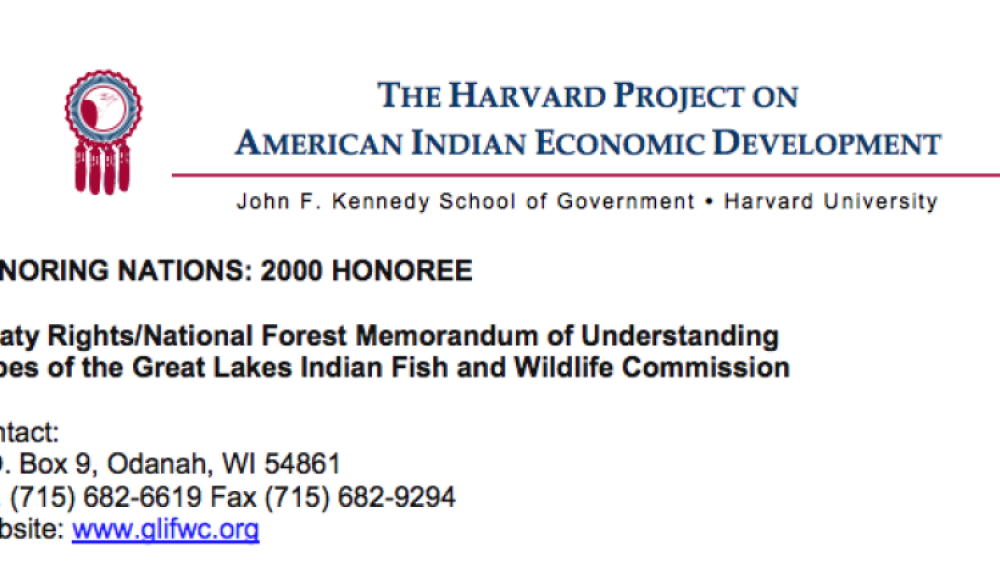
Treaty Rights/National Forest Memorandum of Understanding, Tribes of the Great Lakes Indian Fish and Wildlife Commission
The Great Lakes Indian Fish and Wildlife Commission, a tribally chartered intertribal organization, negotiated a memorandum of understanding (MOU) with the U.S. Forest Service that recognizes and implements treaty guaranteed hunting, fishing and gathering rights under tribal regulations and…
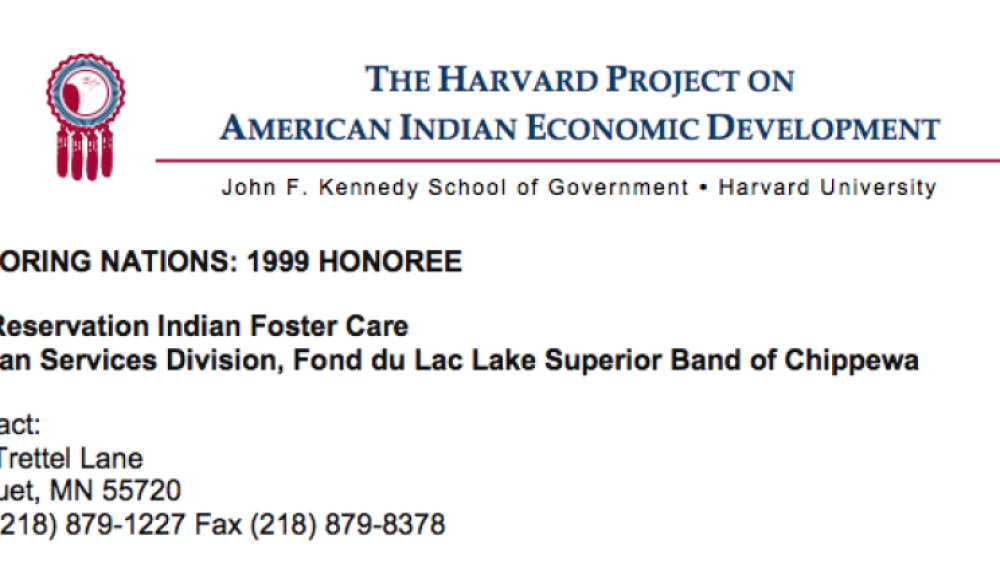
Fond du Lac Off-Reservation Indian Foster Care
By creatively reacting to state laws regarding foster home licensing, the Band established a foster care agency that dramatically reduced the number of Indian children in non-Indian foster care while simultaneously increasing the number of Indian children in Indian foster care. The agency has…
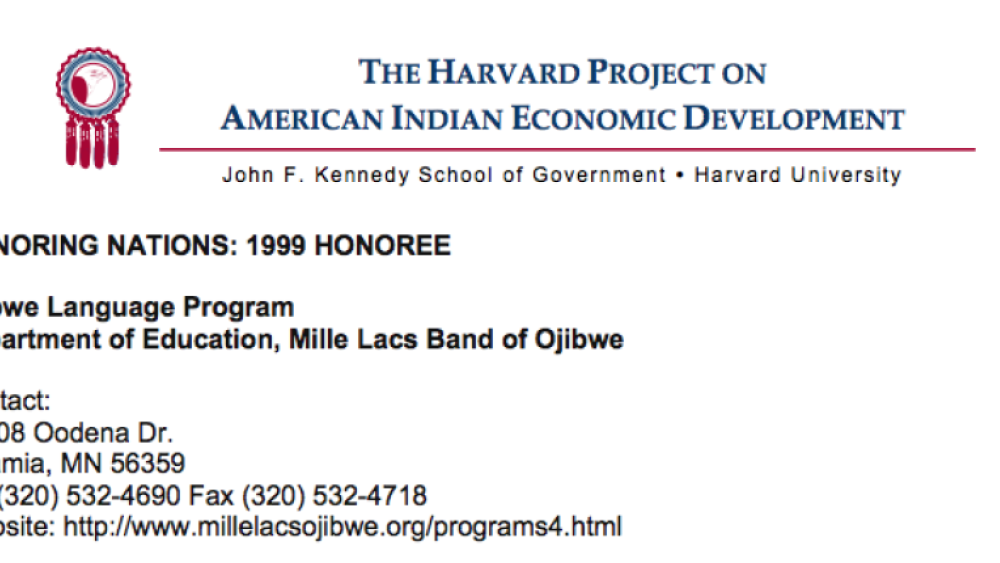
Mille Lacs Ojibwe Language Program
Created in 1995, this tribally funded program serves 350 students (from toddlers to teenagers) and uses elder-youth interaction, song books, and comic books to teach the Ojibwe language. In addition, the Program broadcasts language classes to local public schools in an effort to teach the Ojibwe…
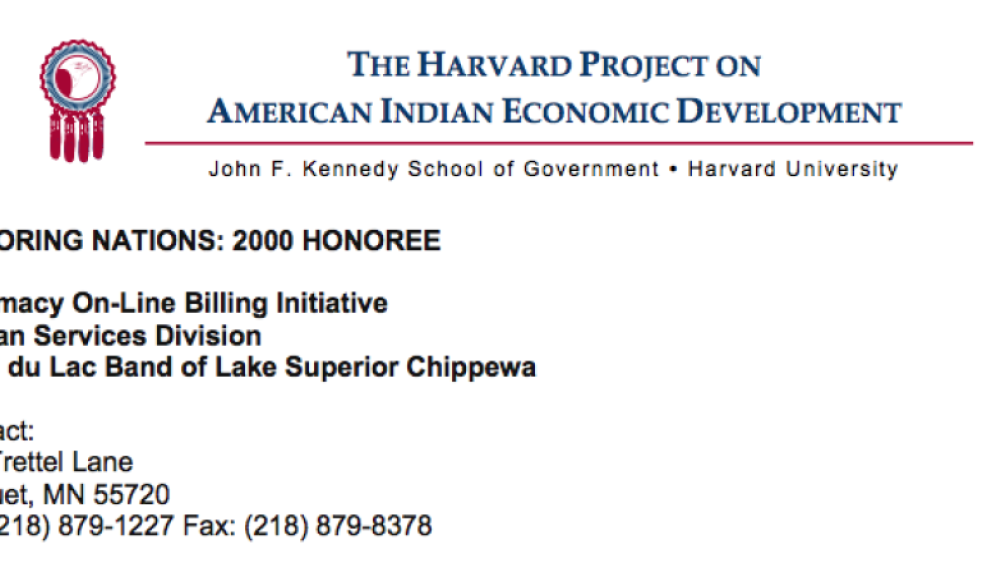
Fond du Lac's Pharmacy On-Line Billing Initiative
In 1995, faced with rising pharmaceutical costs, limited Indian Health Service (IHS) funds, and an inability to bill and collect from third party insurers, the Human Services Division contracted with a private sector firm to design and implement a computerized pharmacy billing system. The first of…
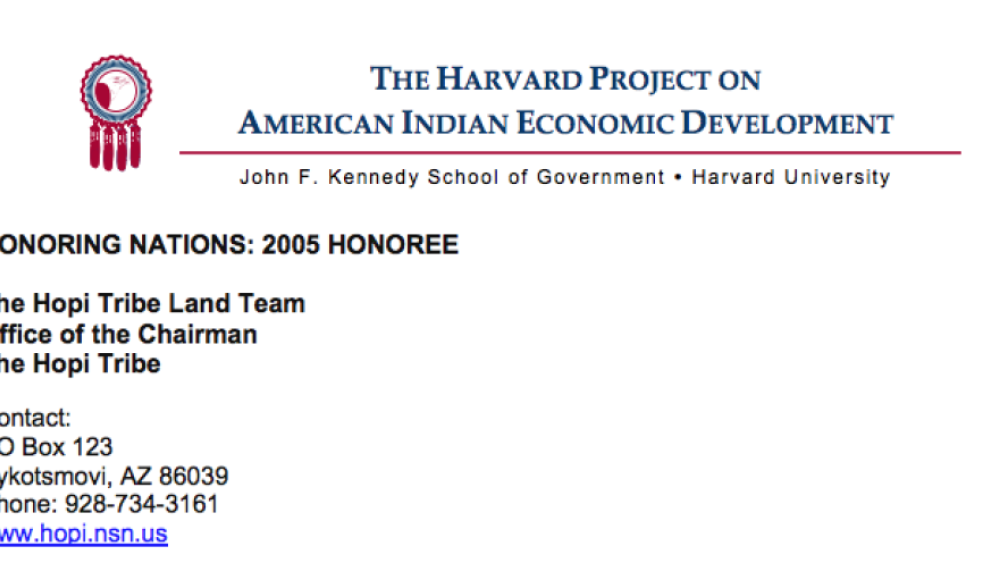
The Hopi Land Team
Reclaiming traditional lands has been a primary concern of the Hopi Tribe for the last century. In 1996, significant land purchases became possible under the terms of a settlement with the United States. The tribal government was faced with the problem of developing a plan for reacquiring lands,…
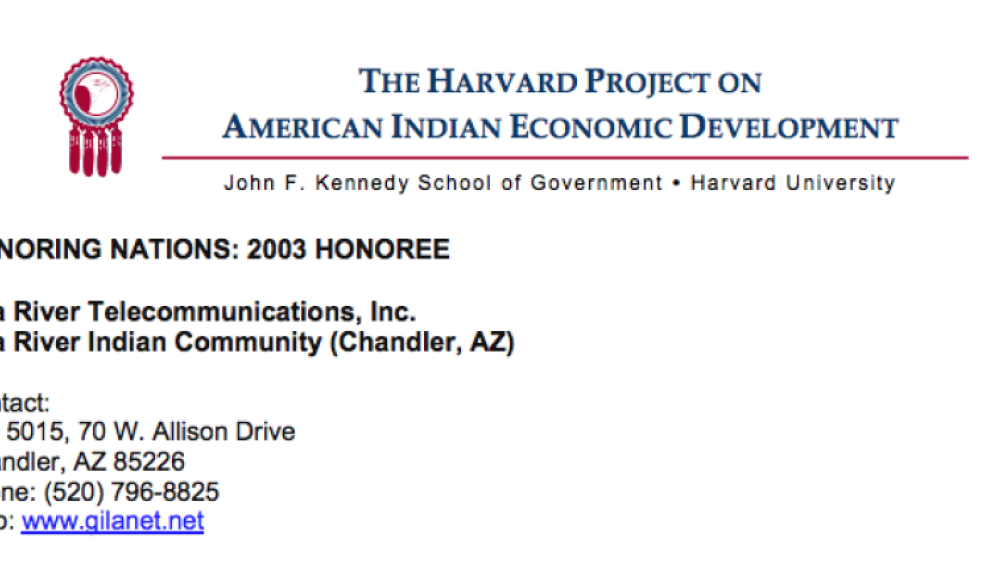
Gila River Telecommunications, Inc.
Recognizing the need for affordable and reliable telecommunications services, the Tribe founded Gila River Telecommunications, Inc. (GRTI) in 1988. A pioneer in telecommunications in Indian Country, GRTI offers affordable landline phone service, dial-up and DSL Internet service, and satellite…
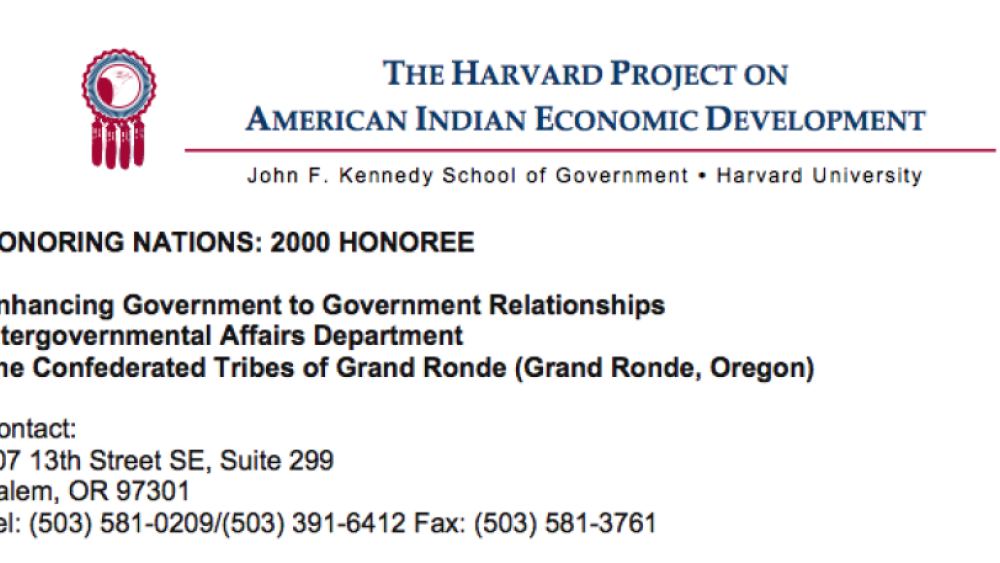
Enhancing Government-to-Government Relationships (Grand Ronde)
The Intergovernmental Affairs Department has achieved positive intergovernmental relationships with federal, state, and local governments by pursuing a five-pronged strategy of communication, education, cooperation, contributions, and presence. Since the Department’s creation, the Tribe has raised…
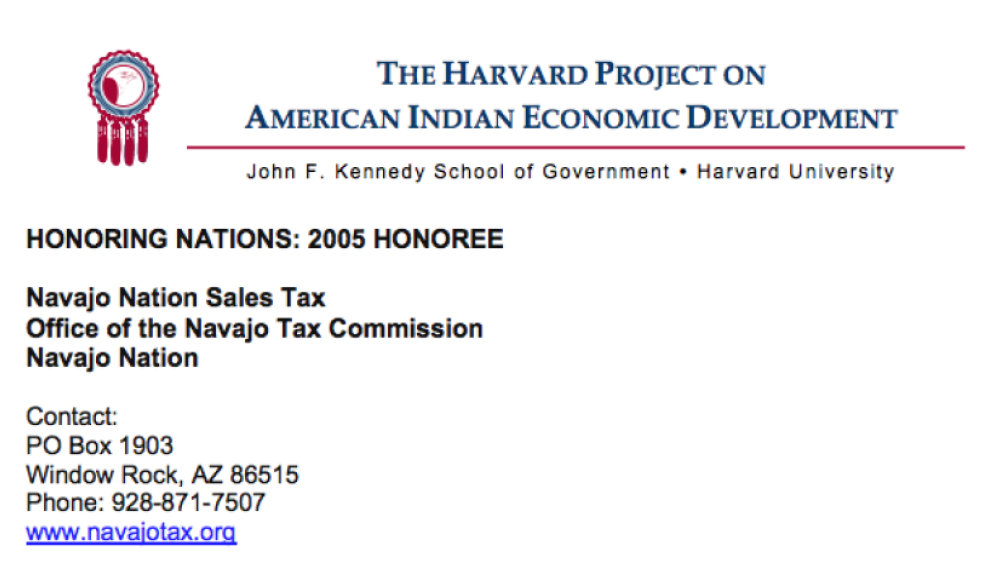
Navajo Nation Sales Tax
Challenges facing sovereign nations include how to support themselves financially, run their governments, and meet the needs of their peoples. In 1974, the Navajo Nation established a Navajo Tax Commission. Following a US Supreme Court decision affirming the Nation’s right to impose taxes, the…
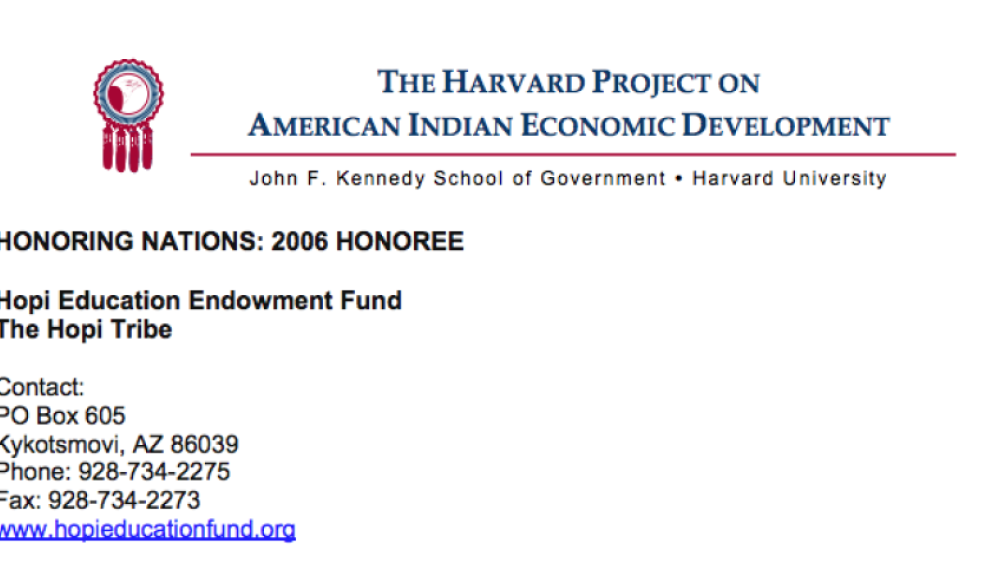
Hopi Education Endowment Fund
In a pursuit to ensure growth, protect assets, and meet the present and future educational needs of the Hopi Tribe, an ordinance establishing the Hopi Education Endowment Fund was approved. Taking advantage of IRS Code Section 7871 allows for tax deductible contributions made to the Tribe to…
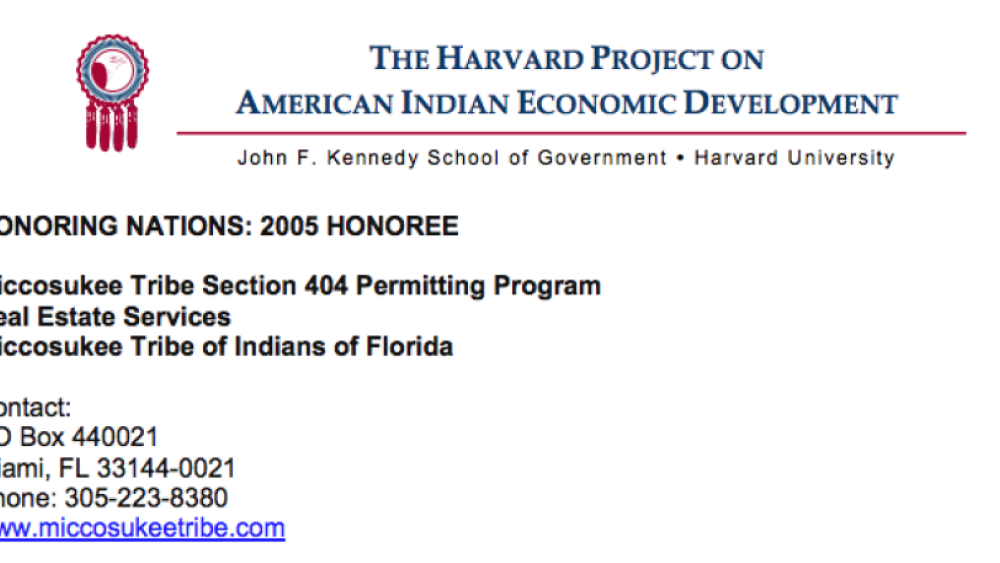
Miccosukee Tribe Section 404 Permitting Program
The reservation lands of the Miccosukee Tribe lie largely within the Everglades National Park. Development on these lands is subject to elaborate regulations by a host of federal agencies that hindered development and other uses of their lands by the Miccosukee people, including the building of…
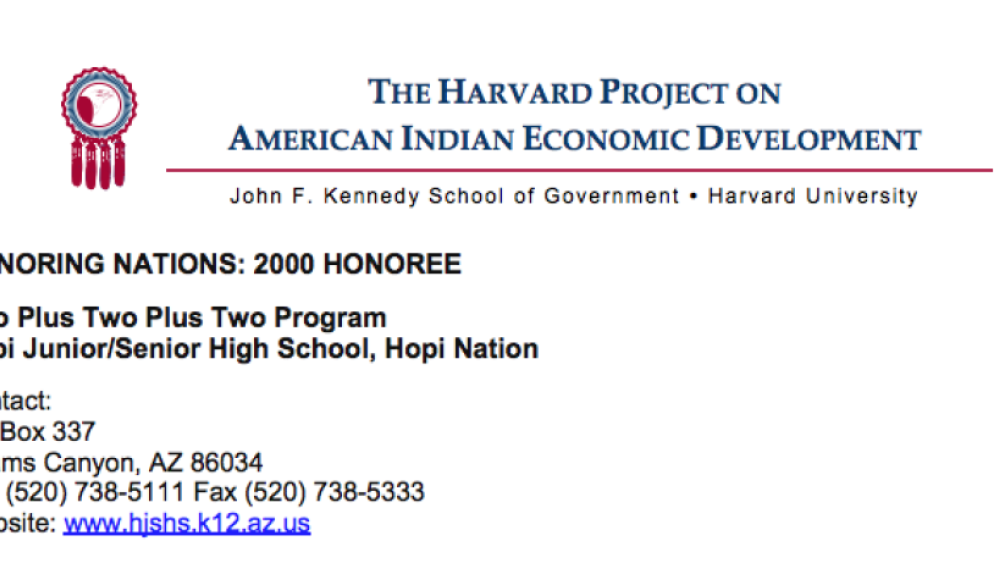
Hopi Jr./Sr. High: Two Plus Two Plus Two
Developed in 1997, the Two Plus Two Plus Two college transition program is a partnership between Hopi Junior/Senior High School, Northland Pioneer College, and Northern Arizona University. The program recruits junior and senior high school students to enroll in classes (including distance learning…
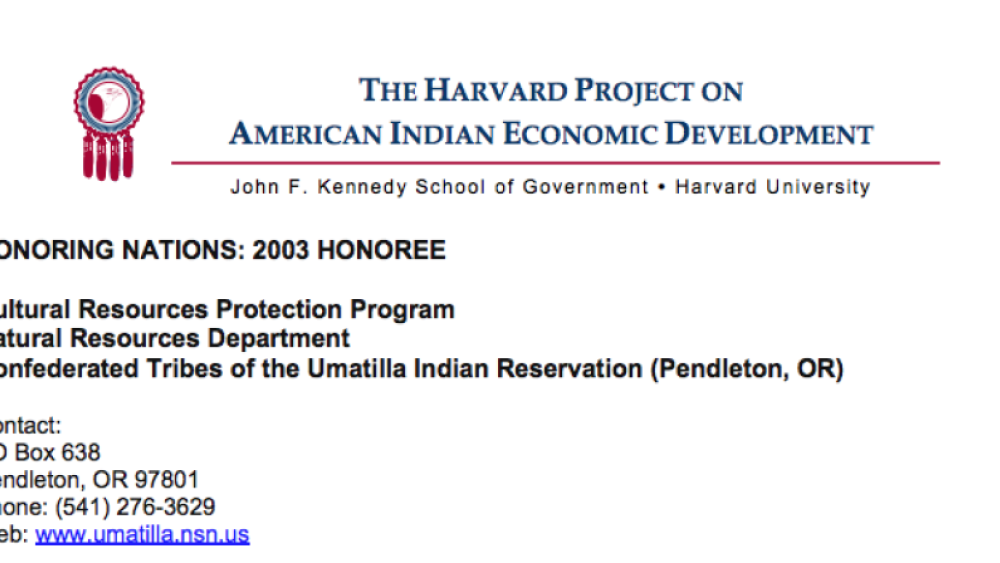
Umatilla Cultural Resources Protection Program
Frustrated by how tribal cultural resources were managed on tribal, federal, state, and private lands, the Tribes developed their own cultural resources protection program. The 15-year-old program is a leader in educating non-Indian agencies about pertinent laws and treaties, strengthening cultural…
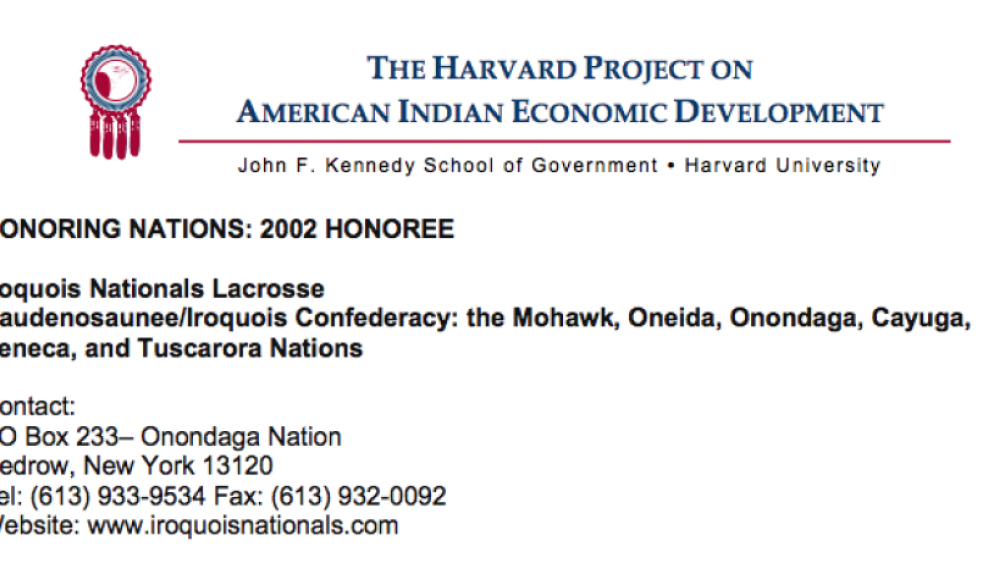
Iroquois Nationals Lacrosse
Officially sanctioned by the Grand Council of Chiefs to represent the Haudenosaunee (or Iroquois) in international lacrosse competition, the Iroquois Nationals Lacrosse Team represents a sovereign nation in world competition. The team — which has won numerous medals and awards — has successfully…
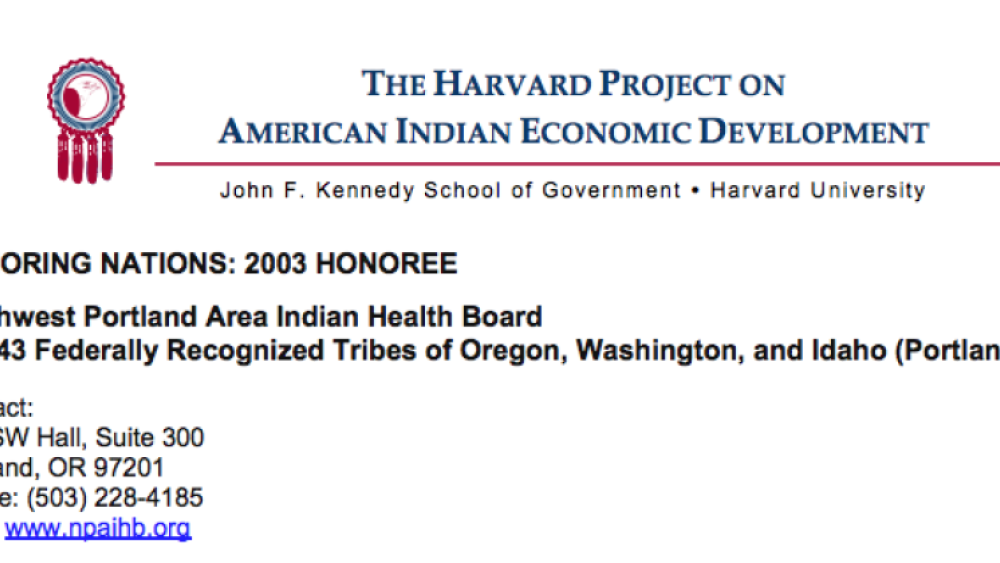
Northwest Portland Area Indian Health Board
Serving tribes in Oregon, Washington, and Idaho, the Northwest Portland Area Indian Health Board (NPAIHB) was created in 1972 to increase tribes’ ability to exercise control over the design and development of tribal health care delivery systems. Governed by tribal government delegates, NPAIHB…
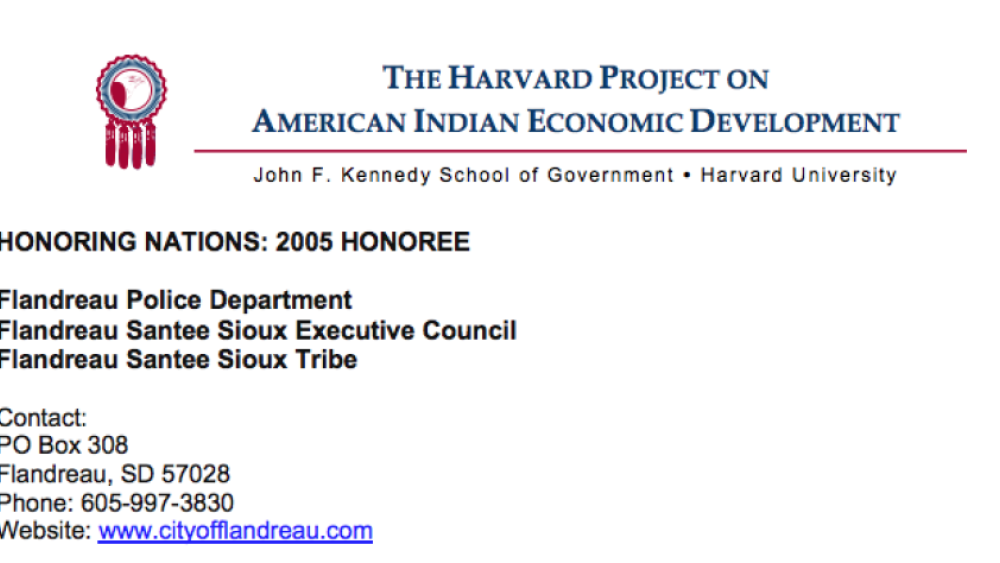
Flandreau Police Department
The Flandreau Santee Sioux Tribe’s lands are situated within Moody County and the City of Flandreau, South Dakota. This location presents the Nation with a particular challenge: How do you provide adequate and culturally sensitive public safety and law enforcement for your citizens in mixed…
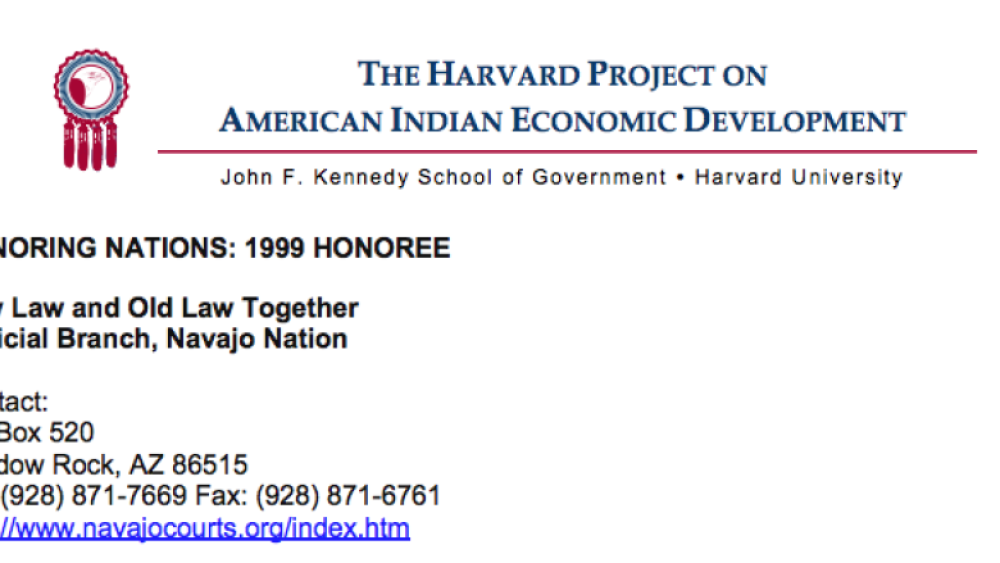
Navajo Nation Judicial Branch: New Law and Old Law Together
The Judicial Branch of the Navajo Nation seeks to revive and strengthen traditional common law while ensuring the efficacy of the Nation’s western-based court model adopted by the Nation. With over 250 Peacemakers among its seven court districts, the Judicial Branch utilizes traditional methods of…
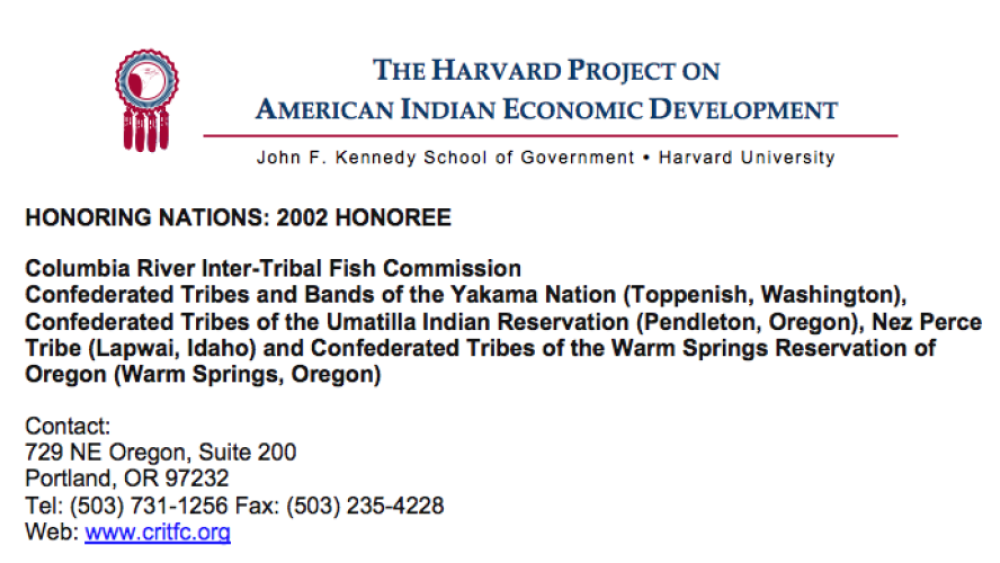
Columbia River Inter-Tribal Fish Commission
Charged with the overall management of its member tribes’ fisheries resources and advocating for the protection of treaty rights, the Columbia River Inter-Tribal Fish Commission’s (CRITFC) programs include fisheries enforcement, policy development and litigation support, fish marketing, and…
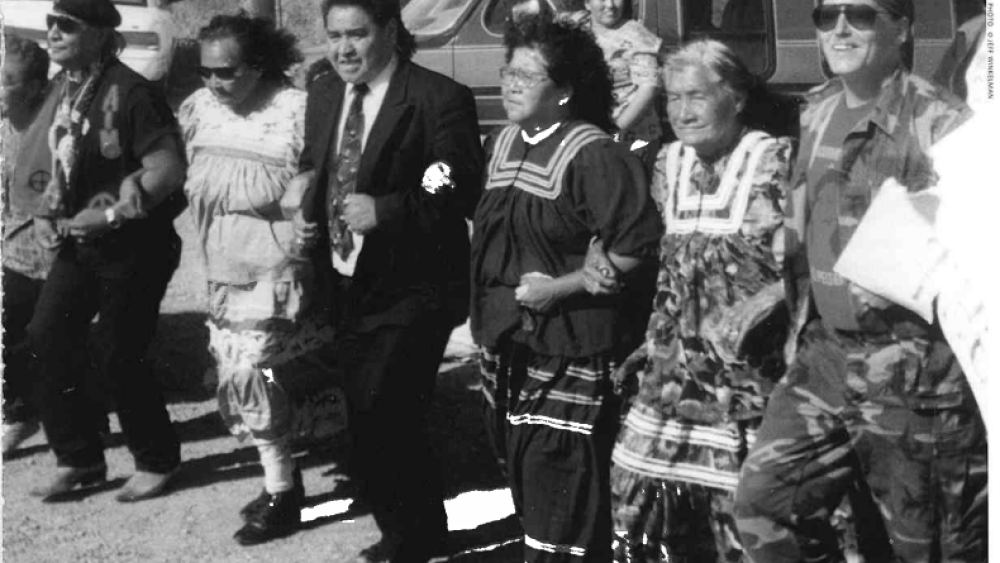
Navajo Treatment Center for Children and Their Family
Responding to high rates of child abuse and neglect, the Navajo Child Special Advocacy Project was launched in 1990 to provide Western and Navajo therapy to victims of sexual abuse between the ages of 3 and 17. With five offices on the Reservation, the project administers Navajo diagnosis,…
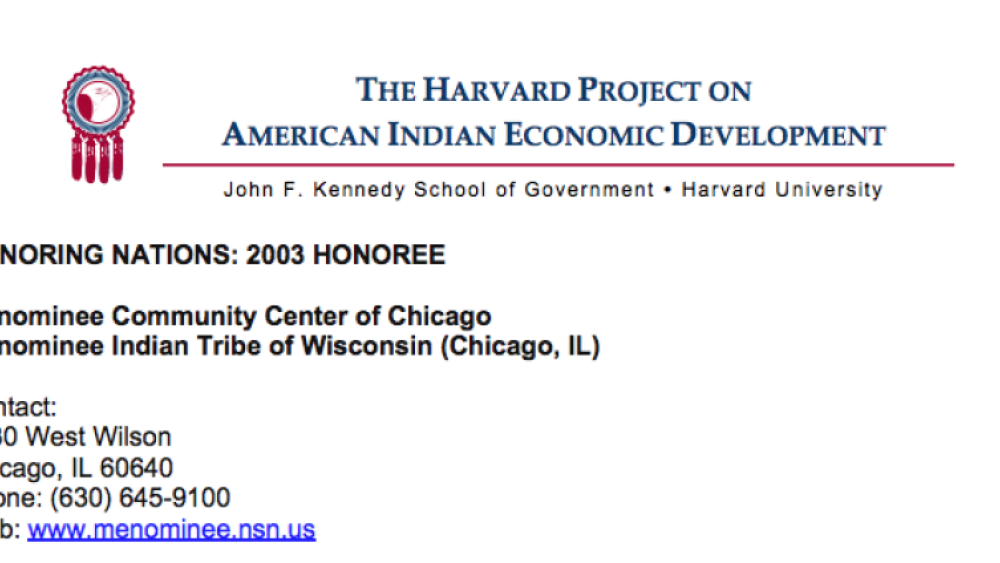
Menominee Community Center of Chicago
A unique partnership between an urban Indian center and a tribal government, the tribally funded Community Center serves nearly 500 Menominee tribal citizens living in the greater Chicago area. The Center and the tribal government work together to ensure that all of its citizens are actively…
